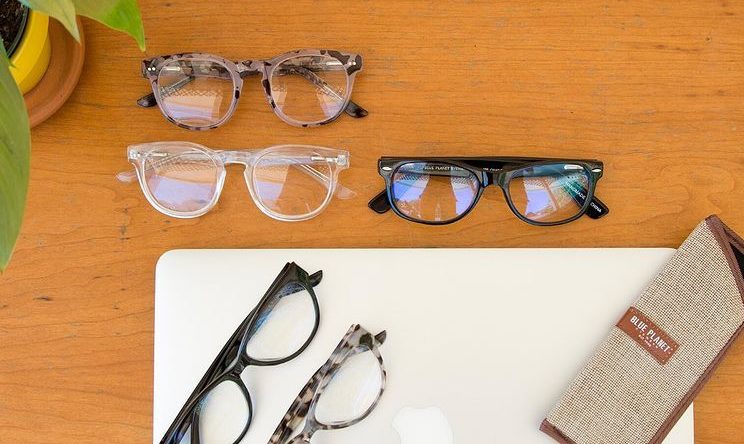We all know to apply sunscreen and wear sunglasses to protect ourselves from harmful ultraviolet (UV) rays from the sun. But did you know that there are other light rays that can damage skin and eyes year-round, even in these winter months? We’re going to explain what blue light is, and why you may want to consider protecting your eyes and skin from its rays.

What Is Blue Light?
The primary light emitted by your digital screens is blue light, also called HEV for High Energy Visible. Here’s a quick science refresher: The visible light spectrum includes Red, Orange, Yellow, Green, Blue, Indigo, and Violet. The white light you see when the sun is shining is a combination of all these colors, which is why the sun is our biggest source of blue light exposure. Fun fact: The way that HEV light scatters off of water and air in the atmosphere is why the sky looks blue!
The colors of the light spectrum each have a different wavelength and energy. Rays of blue light are short and high-energy. Since we spend a large amount of time with our faces closely near our digital devices, protection might be a good idea. In addition to screens, fluorescent bulbs and LED bulbs are also sources of blue light in your home.
How can blue light damage eyes?

You’ve likely experienced eye strain or eye fatigue from staring at a computer screen or smartphone all day. Those feelings of twitching, blurriness, burning, or headaches are largely caused by a lack of contrast on your digital device – that’s why you’re so much less likely to experience strain while reading a physical book. The words on your screen are created by pixels, tiny points of light, which do not have defined edges. This makes your eyes continually strain to focus. Just as HEV light scatters easily, making the sky look blue, the same thing happens on your screen: the scattering of unfocused light adds to the visual overwhelm.
The cornea and lens of the human eyeball do a good job of protecting the sensitive retina from UV light. (But still wear your sunglasses in the sun, because the rest of your eye still benefits from protection.) In contrast, blue light penetrates directly to the retina. This is of concern, because damaging the retina might increase one’s risk of macular degeneration.
The experts at Wiley’s Finest state, “The macula is a small but crucial part of the retina in the human eye and is responsible for sharp central vision, our ability to see fine detail, and distinct color tones. Exposure to blue light has been shown to damage the macula. If the health of the macula degenerates, central vision is lost, and only peripheral vision remains. Diet and lifestyle directly influence macular health. Lutein, zeaxanthin, bilberry, zinc, vitamin E, astaxanthin, and essential dietary fats have been shown to improve macular health.”
How can blue light damage skin?

Just as with your eyes, blue light can penetrate even deeper into the skin than UV rays. According to the skincare specialists at DermaE, “Exposure to blue light might stimulate the production of free radicals in the skin, which may accelerate the appearance of aging.” This means that just like UV rays, too much exposure could lead to wrinkle formation and skin discoloration. More research is needed, but erring on the side of protection might be a good choice.
Can blue light be beneficial?
Blue light makes us feel alert and can boost our moods. That’s why bright white light, including HEV rays, can be used to treat seasonal affective disorder (SAD). Normal, regular exposure to blue light from the sun also maintains our circadian rhythm.
In addition, some studies have set out to determine whether blue light can be beneficial to skin, particularly in cases of psoriasis, acne, and actinic keratosis. Blue light is also used in photodynamic therapy to treat certain kinds of cancers. More research is needed to fully understand when risks may outweigh the benefits of using blue light in these ways.
How can you protect yourself?
Here are some ways that you can reduce your exposure to blue light:
- Limit screen time
- Lower the brightness on your screens
- Turn phones to “night mode”, which uses a yellow light that is easier on eyes and skin
- Use a hands-free option when taking phone calls
- Wear blue light blocking, yellow-tinted glasses like those from Blue Planet Eyewear (available at select Kimberton Whole Foods stores)
- Take eye supplements that contain the key ingredients lutein and zeaxanthin: Try Wiley’s Finest Bold Vision, Life Extension MacuGuard, and Nordic Naturals Omega Vision.
- Use topical skin products that contain key ingredients lutein and antioxidants, such as DermaE’s Blue Light Shield Facial Spray and DermaE’s Blue Light Shield Concentrated Serum
- When outdoors, protect skin with a mineral sunscreen that contains zinc oxide
- Wear polarized sunglasses





